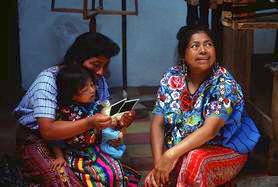

Why Should People Of Faith Be Talking About Trade?*
|
| Working conditions | Millions of people in developing countries are employed in factories owned or subcontracted by transnational companies making goods such as athletic shoes, computer chips or t-shirts for export. When wages are low, working contracts temporary, unions forbidden and factory conditions dangerous, then employees are simply exploited as cheap labor. |
| Inadequate protection for health | When
imports are liberalized without effective health and safety regulations,
consumers can be vulnerable to unsafe goods. |
| Unemployment caused by chasing cheap labor | Local production can be undermined when governments open up markets to foreign companies. This may benefit consumers but destroy local jobs. Global Trade Watch estimates that over 410,000 jobs have been lost in the U.S. as a result of the North America Free Trade Agreement. Other studies indicate that urban workers and farmers in the global South have experienced massive job loss as a result of trade liberalization. |
| Competition from subsidized commodities | In many developing countries the prices of many primary products (cotton, rice, corn, beef) have fallen because rich countries are subsidizing farmers in their countries. This practice leads to surpluses, which are then ‘dumped’ by rich countries on the markets of vulnerable economies, resulting in a bleak struggle for survival for many poor farmers. |
| Increased dependence on imports | Trade can make agricultural inputs cheaper and increase the range of goods on sale. But it can also make people more dependent on imports for essentials like food. People in poverty are especially vulnerable. External changes over which they have no control can raise the price of essentials beyond their reach, while the alternative of self-sufficiency has disappeared. |
| Pressure on natural resources | Production for export (commercial farming, mining or tourism) can result in resources being taken away from domestic producers. In Kenya, for example, the flower farming industry provides employment for around 50,000 people, but other farmers around the shores of Lake Naivasha now struggle to obtain water for their food crops. |
| Reduction in government income | Increases in trade can mean increases in government revenues, but reductions in trade taxes under liberalization can deprive developing countries of a major source of revenue to tackle poverty. On average, one third of developing countries’ tax revenues come from trade taxes. |
| Particular effects on women | Women subsistence farmers have been adversely affected by the sale of land to large companies, leading to reduced food security and a consequent adverse effect on women’s health, and the health of their children. |
What do developing countries risk by dependence on trade?
Developing countries are generally more dependent on trade income than rich countries. This carries huge risks. The larger share of trade in developing countries’ gross domestic product means that these countries are far more vulnerable to change in demand for traded goods. Most of these countries export raw materials, rather than the more lucrative finished goods. In fact, additional import duties in rich countries on finished goods are a powerful disincentive for countries with vulnerable economies to develop value-added production facilities.
Very few countries in the global South have trading companies or governments with sufficient negotiating strength to influence prices. This compares with numerous transnational companies, mostly based in rich and powerful countries in the global North, which are able to control the production, marketing and distribution of many of the world’s most important commodities.
Economic systems embrace more than trade, and economic justice involves more than fair trade practices. But trade rules and practices call for examination partly because the exchange of goods is fundamental to human activity, partly because the trade is being presented to impoverished countries as the solution to their poverty, and partly because trade issues have been neglected by people of faith.
| Trade could be a part of the solution, if it were truly just and placed in the context of social concerns and needs. These are the two most fundamental aspects of trade that challenge the community of faith. The U.S. Interfaith Trade Justice Campaign seeks to speak out, judge righteously, and defend the rights of the poor and needy (Proverbs 31:9) in its critique of the current global economic system. At the same time the Campaign proclaims a positive vision of a just global economy where justice can roll down like waters (Amos 5:24) in the world’s market places. |
* Adapted from materials by Christian Aid (www.christianaid.org.uk) and the Washington Office on Africa (www.woaafrica.org)

 How
does our faith connect with the injustices of the world?
How
does our faith connect with the injustices of the world?